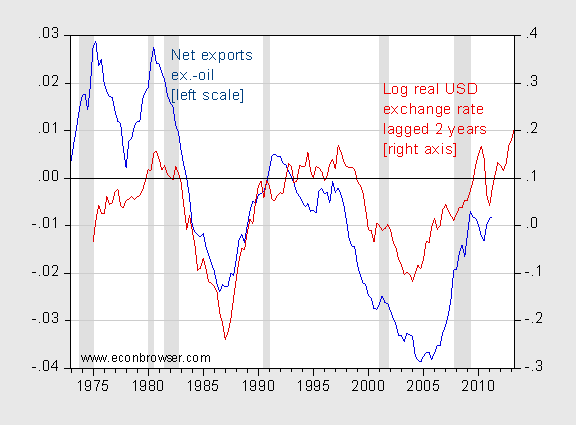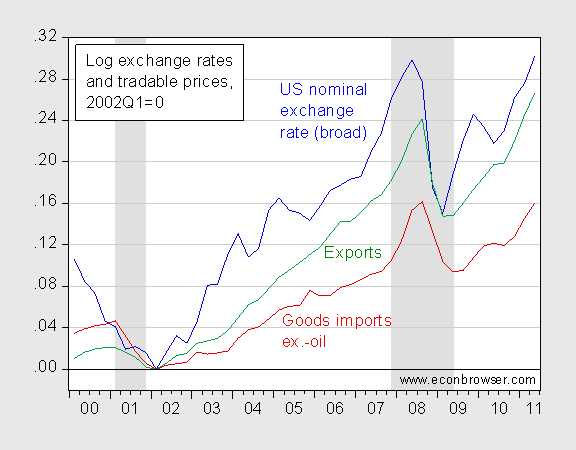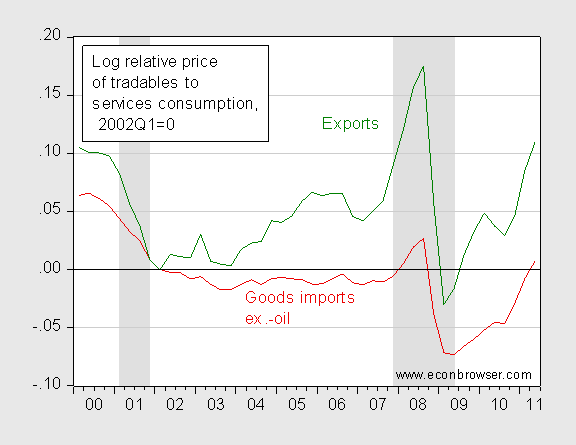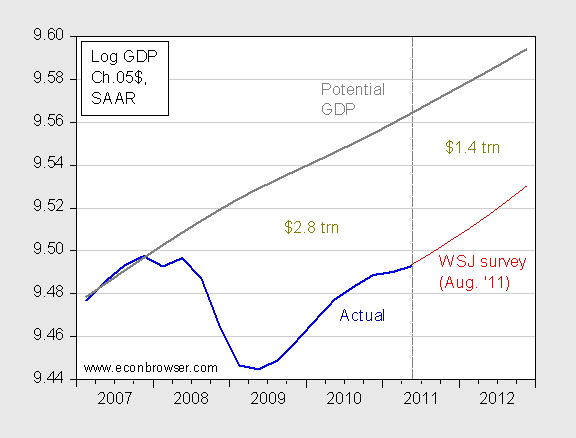Some groups have overstated the need for immediate fiscal retrenchment in order to push an agenda spending cuts, when in fact we face more serious problems of medium and long term spending growth and lagging tax revenues, and overall increasing indebtedness to the rest-of-the world. That second point (which I first made in 2005 [0] ) has been somewhat neglected in the (misplaced) focus on reining in spending at the short horizon.
So it seems an appropriate time to revisit the issue of whether the US economy – private and public — is shifting away from borrowing from abroad, and producing more than we consume. My three observations:
- Dollar depreciation is supporting adjustment toward a smaller non-oil trade deficit.
- Exchange rate pass through into import and export prices is one channel by which this adjustment is occurring.
- The relative price of exported goods is rising, while the trend in imported goods prices has changed.
Dollar Depreciation and the Trade Balance
First, I reprise a graph that tracks the trade balance, and the dollar exchange rate, lagged two years, to take into account the fact that adjustment to changes in relative prices take time.

Figure 1: Net exports ex.-oil (blue, left scale), and log USD real exchange rate against broad basket of currencies, lagged two years (red, right scale); up is depreciation. NBER recession dates shaded gray. Source: BEA, 2011Q2 2nd release, Federal Reserve Board, NBER, author’s calculations.
Note that the improvement in the trade balance was interrupted by the financial crisis, and the safe-haven appreciation of the dollar. Now, with the dollar resuming its downward course, holding all else constant, the trade balance should continue its improvement. However, extended improvement depends on future dollar depreciation (which is in doubt [1]) and vibrant rest-of-world growth. The IMF’s Article IV on the US forecasts a reduction in the overall trade balance to GDP ratio. Deutsche Bank also predicts a stabilization in the current account.
Exchange Rate Pass-Through, Again
This improvement has occurred as exchange rate changes have fed through into import and export prices. It’s of interest to compare the changes in the price of imports and exports against the dollar change. Import pass through appears lower than export, which is in line with the literature. [2] [3].

Figure 2: Log USD nominal trade weighted exchange rate against broad basket of currencies (blue), goods imports prices ex.-oil (red) and exports prices (green). NBER recession dates shaded gray. Source: BEA, 2011Q2 2nd release, Federal Reserve Board, NBER, author’s calculations.
The Internal Exchange Rate
The trade weighted USD exchange rate is an external relative price. There is an internal one as well. Rebalancing the US economy requires greater production of tradable goods, and less nontradable, so the relative price of tradables versus nontradables is relevant. I proxy nontradables prices with the price of services consumption.

Figure 3: Log relative price of exports to services consumption (green), and log relative price of non-oil goods imports (red). NBER recession dates shaded gray. Source: BEA, 2011Q2 2nd release, NBER, author’s calculations.
Figure 3 illustrates that on the eve of the Great Recession, the relative price of tradable goods was rising (or that of nontradables was declining). The collapse in tradable prices was due to the dollar’s rise post-Lehman. With the resumption of global growth tradables prices have resumed their rise.
What Could Slow Rebalancing?
The foregoing discussion might lead people to think that all that is required for further rebalancing of the US economy is continued dollar depreciation. That is far from the truth; here it’s important to think in terms of an interlinked, multi-country global economy. In particular, working off a one country (textbook) model, one might conclude fiscal contraction would accelerate rebalancing. However, if the fiscal contraction is rapid, and is mirrored in the rest-of-the-world, the economic contraction is propagated, and the end effect is economic contraction exceeding that obtained in a one-country model, and with less trade deficit reduction. This, I think, is part of the reason why IMF Managing Director Lagarde so forcefully argued at Jackson Hole against overly aggressive fiscal consolidation based on near term spending cuts. (Obviously, what happens in China and other surplus countries matters as well. [4])
Just to place in context the amount of economic slack in the US economy, I present in Figure 4 the output gap, based on the latest GDP release and estimates of potential GDP, and the August WSJ mean forecast.

Figure 4: Log GDP (blue), potential GDP (gray) and forecasted GDP according to mean of August WSJ survey (red), all in Ch.2005$, SAAR. Cumulative losses 2008Q1 up to 2011Q2, and implied losses 2011Q3 up to 2012Q4. Source: BEA, 2011Q2 2nd release, CBO Budget and Economic Outlook: An Update (Aug. 2011), WSJ (August survey), author’s calculations.
Some estimates of spillover effects are here (Table 3).
Here an idea, eliminate the tax deduction for mortgage interest on mortgage with an interest rate over 3.8%.
Then watch bank rush to refinance current debts. And then the economy improve as personal balance sheets recover.
What could slow balancing?
Oil.
Dear Professor Chinn,
Looking at your Figure 4, if you had unbridled power to make changes, what is your prescription to rapidly change our path to achieve the potential GDP? Do we need massive government spending, incentives for consumers to spend, reduction of corporate income taxes, incentives for risk takers to develop new business enterprises, some combination of the above or something entirely different of your own creation.
There are only five factors which could slow re-balancing, I think:
1. need to repair consumer and financial sector balance sheets:
Certainly an issue, but as this indicator seems to be improving, it’s not immediately apparent why it would lead to the recent slowdown.
2. federal budget deficit:
We debate this all the time here on Econbrower. Does deleveraging the private sector while leveraging up the public sector really make sense? Certainly interest rates are low, but the deficit contributes to the feeling that the current environment is unsustainable. It’s a momentum killer–but it hasn’t gotten any worse, really. And the budget deal should have rallied the markets, if deficit spending were viewed as “good”. But just the opposite happened.
3. over-priced currency:
A weaker dollar would certainly help re-balancing by promoting exports. But it’s hard to argue the dollar is over-valued as it is.
4. regulation:
One hears this a good bit in conservative circles, but other than Obamacare and a relatively slow permitting of drilling, and Frank-Dodd, I don’t sense that regulation is the problem that it was in, say, the 1970s. I don’t viscerally feel that economic activity would explode if only we de-regulated.
5. oil
Given the recent price spike in oil, its historical impact on the economy, the global nature of the slowdown in the advanced economies, oil is really the only factor which has a compelling narrative at the present.
Many thanks for the update on the big picture, Menzie.
Would you agree that that the large and persistent US output gap has tended to make the (exchange-rate adjusted) trade balance better than it would otherwise have been? (I’m squinting at your striking trade balance graph as I write this.)
Is it fair to say that macro policymakers face hard choices between between internal balance (i.e. output gap closing) and external balance (i.e. current account balance)?
Steve Kopits,
I don’t viscerally feel that economic activity would explode if only we de-regulated.
In financials, it would. Dodd-Frank is a terrible bill.
If you look at the stock market by sector, Financials are the only sector that are still dramatically lower than they were in 2006. Most other sectors have caught up to 2006 levels.
“I don’t viscerally feel that economic activity would explode if only we de-regulated.
In financials, it would. Dodd-Frank is a terrible bill.
If you look at the stock market by sector, Financials are the only sector that are still dramatically lower than they were in 2006. Most other sectors have caught up to 2006 levels.”
This is a parody right?
I don’t have a strong opinion as to whether cutting back on deficit spending will help or hurt in the short term. However, absent real deflation, which I see as damaging, the question I would raise is whether it is really in the best interest of the country to continue to rack up debt now. Even if there is a right academic answer, one has to take into account the political risk. Politicians do not behave like model Keynsians. They are experts at one thing – promising that they will cut spending as soon as the crisis is over. But there is always another crisis to follow that can be used as an excuse to not take our medicine. Politicians are best described as half Keynsians, and you can bet that the half they follow is not running a surplus to attenuate a boom.
In daily life people who overspend their income by racking up huge debts have to deal with a lowered standard of living until they can repair the balance sheet. They don’t measure their financial health based on an ever-increasing level of consumption that is premised on racking up more debt.
So is the government better off following the household model, on the basis that politicians are not to be trusted to execute long-term spending cuts while spending now? Would a no-growth economy with both private and public deleveraging be a reasonable response to a severe debt binge?
I have no answers but I thought the question is worth asking, since everyone including politicians and academics seems focused on GDP growth alone. Republicans counter Democrats’ stimulus claims with their counterclaims that the economy will grow in part if government spending is restrained. But perhaps growth is not the right measure of soundness in the current situation.
I am being an idealist in thinking that any politician would tell voters that government deleveraging will cause economic stagnation but is the right thing to do. But as long as government actually deleverages, what politicians predict will happen is irrelevant. Jimmy Carter lost in large part because he did the right thing in hiring Volker to stamp out inflation, which put the kibosh on growth. If austerity causes the economy to remain slow but then we are left with a repaired balance sheet, Republicans may suffer Carter’s fate. But the right policy pursued for mistaken reasons is still the right policy.
“I don’t viscerally feel that economic activity would explode if only we de-regulated.”
I agree it wouldn’t explode, but excessive & badly designed regulation are a huge problem. Avoiding the visceral, let me present 3 bits of evidence in addition to Obamacare, Dodd-Frank, & drilling hold-up.
1) There were no shovel ready projects when the Obama administration tried to pump the money out the door. There were none because choking regulation makes many projects take a decade.
2) The choked foreclosure process, the resolution of which must precede the eventual nadir of housing prices. There are many buyers who can’t proceed because things are mucked up.
3) Utilities can now perceive that the Obama administration will circumvent Congress–remember when Democrats valued the rule of law?–to shut down 10% of coal-fired power generation in the country.
However, absent real deflation, which I see as damaging, the question I would raise is whether it is really in the best interest of the country to continue to rack up debt now. Even if there is a right academic answer, one has to take into account the political risk. Politicians do not behave like model Keynsians. They are experts at one thing – promising that they will cut spending as soon as the crisis is over.
Your statement would be correct if you said that Republicans do not behave like model Keynesians. As you pointed out, it was Carter who bit the bullet and made the hard decision on inflation. It was Reagan who then squandered the sacrifices of his predecessor with record deficit spending and irresponsible tax cuts. It was Clinton who abandoned some of his favored spending programs and balanced the budget in the good times. It was G.W. Bush who again squandered the surpluses with new record deficits.
The obvious conclusion is that if you want any sanity in fiscal matters, never, ever vote for a Republican. Republicans have demonstrated over and over again, most recently in phoney debt crisis fiasco, that they simply cannot be trusted with the economy.
As government spending becomes a bigger part of the economy, not only is our mulitplier likely less than 1, it is most certainly falling.
“J’aime mieux un vice commode qu’une fatigante vertu” Molière “I give preference to an easy vice over a tiring virtue”
Nice charts on exports, but they do not match the net exports of goods and services as exhibited by Fred (source BOEA) the net exports of goods and services are on a declining trajectory (~ – 600 billion usd) http://research.stlouisfed.org/fred2/series/NETEXP.
and are not offset by receipts on US investment abroad (Income Receipts on U.S. Direct Investment Abroad (BOPXMDN)
The duality of the external debts,fiscal deficit is addressed soberly “This time is different”
No recovery will take place during the public debts build up,but only at debts picks.
“Syndrome is the false belief that domestic debt is a novel feature of the modern financial landscape. We also confirm that crises frequently emanate
from the financial centers with transmission through interest rate shocks and commodity price collapses.”
“Countries have instead been relying more on domestic currency debt issued in local markets. Reliance on domestic debt is hardly new, and the view that domestic debt can be largely ignored in looking at external debt sustainability is hard to reconcile with the extensive historical experience.”
And not to forget:
“An even stronger regularity found in the literature on modern financial crises (e.g.,Kaminsky and Reinhart, 1999 and Reinhart and Rogoff, 2008b) is that countries
experiencing sudden large capital inflows are at a high risk of having a debt crisis.The historical record, however, suggests that a high ratio of domestic to external debt in overall public debt is cold comfort to external debt holders.Default probabilities probably depend much more on the overall level of debt”
The existing fundamental failures of the supra national economic bodies,public governance bodies and all ancillaries public functions gravitating around tax payers moneys have to be addressed.
This time is not different.
All this means is not that spending should be ramped up but that debt needs to be liquidated to get more in line with real income growth (tax revenue). Had decisions need to be made on what we really need and what we can afford ….not on what we “want” to have and how much debt can we take on to get it….there are certainly regulations that have been put in place that have cause the marginal cost of production to rise enough to encourage production to move to cheaper places…are the regulations value added versus the cost???
Going soft, am I?
Given the nature of much of our work (and our Wall Street location), I am aware of the impact of certain regulations.
For example, we just supported the successful IPO of a US oil technology company on London’s AIM exchange. Why there? Lower compliance burden.
I personally find most of the SOX stuff we encounter to be just good financial reporting practice, but compliance can be quite costly for a smaller company.
It would be interesting to see a post on the impact of SOX on US vs UK IPO’s, and an analysis of the potential impact of Frank-Dodd.
Menzie wrote:
Note that the improvement in the trade balance was interrupted by the financial crisis, and the safe-haven appreciation of the dollar. Now, with the dollar resuming its downward course, holding all else constant, the trade balance should continue its improvement.
Only in a bizarre mercantilist world could a 2008 crash in international trade be cosidered an improvement because imports crashed more than exports narrowing the balance of trade. Sure the house burned down but what an improvement; the kitchen is now larger than the dining room.
Anonymous 6:49AM aka Ricardo aka RicardoZ aka DickF: Only the most dogmatic would insist that the use of the word “improvement” constitutes a general ideological statement — but if it makes you feel better, I would be happy with the word “increase”.
Minzie,
You seriously want us to believe that you do not mean improvement when you use the word “improvement?” What would make me feel better is if international trade would recover.
The mercantilist fiction of some kind of magic in reducing the difference between imports and exports is not really that important. International trade always balances. The measured difference is due more to methodology than reality.
The crash of the dollar against foreign currencies is making world trade decline, but that doesn’t bother the mercantilist because he celebrates the difference between imports and exports growing smaller.
Oh, sorry I made you type so much because I didn’t input my name. That was an accident but your note fixed it fine. Thanks.
Ricardo You are welcome.